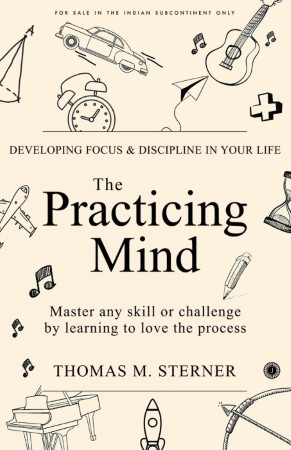The Practicing Mind - Book Notes
Created 24 Aug, 2025
Book by Thomas M. Sterner
“Master any skill or challenge by learning to love the process”
1. The Learning Begins
We do things like driving a car without much thinking. That comes from practice. Do everything from practice.
2. Process, Not Product
- When you’re doing something, ‘be here now!’ Do not think about expectations, stress, how you’re doing, etc.
- Make the ‘process’ the goal, not the ‘product’. Product follows automatically once the process is done well.
-
Do not learn passively, practive actively.
- To state Bhagavad Gita (not mentioned in the book):
Karmanye Vadhikaraste
(कर्मण्येवाधिकारस्ते): You have a right to perform your actions or duty.
Ma Phaleshu Kadachana
(मा फलेषु कदाचन): But never to the fruits of your actions.
Ma Karma Phala Hetur Bhur
(मा कर्मफलहेतुर्भूर्मा): Never consider yourself the cause of the results.
Ma Te Sango 'Stvakarmaṇi
(ते सङ्गोऽस्त्वकर्मणि): And never be attached to not doing your duty.
- Be deliberate, have an intention about what you want to accomplish, and remain aware of that intention.
3. It’s How You Look at It
“At what point in a flower’s life, from seed to full bloom, does it reach perfection?”
- Do not keep expecting a future ideal self. Live in the present, every moment is ideal. Being here now is what most religions teach too.
4. Creating the Habits We Desire
- Starting a new habit may feel strange. But through deliberate repetition, the new way feels normal. Just relax and stay in the process, do not think or worry about anything else.
- Use a ‘trigger’ to stop/create habits. For example, do not lift the phone up while working - that’s the trigger. Once you lift up, it’s the same old bad habbit again. Same for good habits - if you’re into archery, just say “This is what I need to do. Here I go” instead of any negative thinking or critisizing your last shot. Triggers should guide you the next steps naturally, like an algorithm.
5. Perception Change Creates Patience!
- Re-read or re-iterate good virtues so that you’re not lost in the chaos of life.
- Focusing on the present also helps you fully put your energy into the task.
- Steps in creating Patience:
- Become aware of your internal dialogue, watch how it’s getting distracted. Stay in the present.
- Understand and accept that
there is no such thing as reaching a point of perfection in anything.
It’s like a sailor trying to reach the horizon…
6. The Four “S” Words
Simplify, Small, Short, Slow!
- Simplify the task, make it small and short. Do it slowly.
- The Slow part is a paradox. When you’re doing something slowly, you get fully absorbed in it, and are not wasting away your energy. Hence you end up doing it quicker!
7. Equanimity and DOC
- Equanimity is defined as even-temperedness and calmness.
- Watch yourself, the Ego (the running mind, as 2nd person) as the Observer (You, the 1st person). The Ego a lot of emotions and is subjective, whereas the Observer is objective.
- Do not judge anything. Non-judgement helps one work more efficiently.
- DOC: Do, Observe, Correct. Do the task, Observe yourself, Correct yourself so that you’re better next time. This is evaluation, different from judgement which comes after an evaluation. Do not proceed to judge, just correct yourself and stay in the process.
- To repeat the ideas from the previous chapters, start small, short and slowly. Re-iterate the habits deliberately until they come naturally. Stay in the present.
8. Teach and Learn from Children
- Wisdome is not a by-product of age. Teach and learn from all those around you.
- You learn from anyone by teaching, because you listen to yourself expound and explain and breakdown the concepts while teaching.
9. Your Skills are Growing
- Choose your habits. Stay in the moment.
- With deliberate and repeated effort, growth is inevitable.
